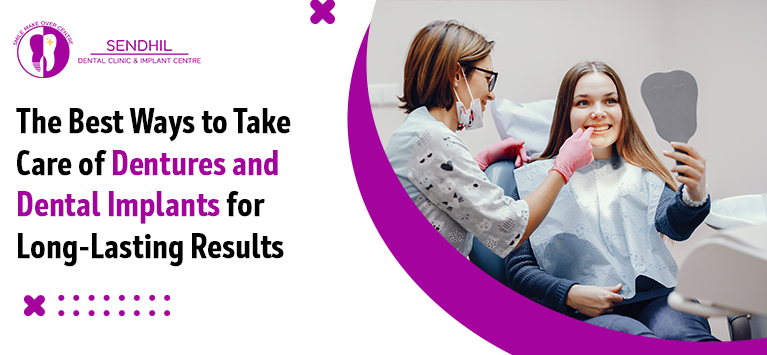
The Best Ways to Take Care of Dentures and Dental Implants for Long-Lasting Results
Congratulations – you have gone through the difficult stage of installing implants. The main and most difficult treatment has been completed; now it remains to save the result, for which you need to strictly follow the doctor’s recommendations, regularly undergo preventive examinations and professional oral hygiene according to an individual schedule, and be sure to carefully follow the hygiene rules that you will carry out at home. All this will reduce the possible consequences to a minimum, as well as speed up the return to the usual way of life.
If you have a temporary adaptive prosthesis and if you have not yet gone through its replacement, then you will need to change the design to a permanent one in the near future. The doctor will tell you about this need at the next preventive examination or during complex hygiene. The fact that it is time to change the prosthesis will also tell you some of the symptoms that we have reflected in this memo.
Caring for dentures at home and away from home
Previously, removable dentures were made from rubber, so caring for and storing them had its own nuances, which was due to the rapid drying of the material in the air. Therefore, after removal from the oral cavity, they were placed in an aqueous solution. Currently, such prosthetic devices are made of nylon or acrylic resins, which eliminate storage in liquid. At the same time, it is necessary to pay attention to proper care of prosthetic devices at home, as well as undergo professional dental cleaning 2 times a year.
Let’s now talk about the main intricacies of caring for prosthetic structures at home and professionally.
How do you care for dentures?
Caring for dentures includes activities related to daily hygienic cleaning of the denture device, elimination of pathogens, and proper storage. Many patients do not follow basic rules for caring for orthopedic structures, which can lead to premature failure.
For example, using a regular brush and paste may cause minor scratches on the denture. In turn, increased surface roughness provokes the appearance of age spots and dental plaque, as well as an undesirable odor. To extend the service life of the prosthesis, experts advise adhering to certain rules.
Caring for different types of dentures
There are two options for prosthetic structures – removable and non-removable. In the first case, acrylic and nylon materials are used in the manufacture of such products. Caring for such dentures involves cleaning them with boiled water or special antiseptic compounds. They can be purchased at pharmacies. Here a water-soluble tablet intended for the care of dentures is being talked about. To fix such orthopedic devices in the oral cavity, creams, strips, or adhesives are used. This method of care is used when installing partially removable clasp-type structures. Dental implants, bridges, crowns, and veneers require more careful care.
Care and cleaning of plastic dentures
As a rule, caring for removable dentures made of plastic includes the use of special rinses, cleaning with toothpaste twice a day, and treatment with disinfectants. To clean hard-to-reach areas, they resort to using dental floss and a brush.
To eliminate bacterial accumulations, the prosthetic device is rinsed with water, cleaned with a special paste, and then placed in an antiseptic. Twice a year, the structure is taken to a specialist to remove accumulations in a clinical setting.
Care and cleaning of nylon dentures
To maintain the beneficial properties of nylon structures, such as functionality and flexibility, as well as to prevent the appearance of unwanted odors, certain care rules should be followed.
First of all, any possibility of harsh mechanical impact, including the use of brushes with hard bristles, is excluded. To clean prosthetic devices made of nylon material, it is recommended to use only soft pastes and brushes that do not contain abrasive components. In addition, to protect against aggressive influences, experts advise installing and removing nylon products over a sink with water.
It is also important to consider that nylon absorbs odors well and is susceptible to food dyes, which require regular disinfection using special tablets.
Caring for clasp dentures
In the production of partially removable clasp-type prosthetic structures, various materials can be involved. The most common of them are plastic and cermet. The rules for caring for such dentures are selected taking into account the material used. It is important to remember that the arcs of such orthopedic structures are made of metal material.
If the archwire is made of separate components, the areas of their connection are not machined in order to prevent the appearance of a dark coating. In addition, a soft-bristled brush is used when cleaning such prosthetic devices. Also, once every 7 days, clasp-type prostheses are placed in a special biosolution, which allows you to quickly remove food particles and eliminate dark areas.
When should you see a doctor?
It’s crucial to consult your dentist if you notice any of the following symptoms:
- Unexpected pain, increased body temperature, chills,
- Numbness of the maxillofacial region, which was not previously,
- When pressing on the implants, discomfort or sharp pain occurs,
- reddening of the gums, swelling of the mucous membrane, bad breath,
- There is pain in the temporomandibular joint; it is difficult to move the lower jaw; it crunches or does not open/close,
- The teeth do not close (along the entire length of the dentition or only on one side), there was a feeling of displacement of the prosthesis,
- The prosthesis became mobile; there was a chipped part of the teeth,
- It hurts to chew on one side or use all of your teeth.
The very first and most dangerous period, in which complications most often occur, is left behind. But this does not mean that you need to relax and forget about your teeth. If you have chosen an adaptive prosthesis, its replacement with a permanent design is ahead. In addition, complications can occur after complete implant engraftment (but this happens extremely rarely). Therefore, just follow your feelings, especially since enough time has already passed and you have an understanding of what is the norm and what is a deviation from it. Be attentive to your teeth and your body – show a careful attitude, and implants will answer you the same!
Conclusion
Caring for your dentures and dental implants is essential for ensuring their longevity and your oral health. Whether you have removable or non-removable prosthetics, following proper hygiene practices and seeking professional care when necessary is key. Be attentive to any discomfort or unusual symptoms and consult your healthcare provider promptly. With diligence and regular maintenance, you can enjoy the benefits of your dental work for years to come, helping you maintain your smile and oral well-being.



